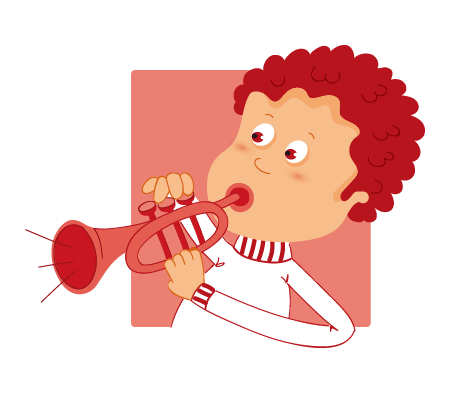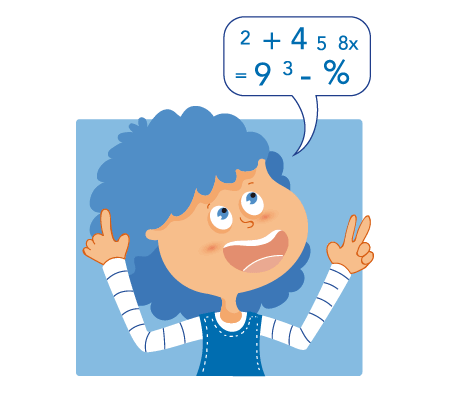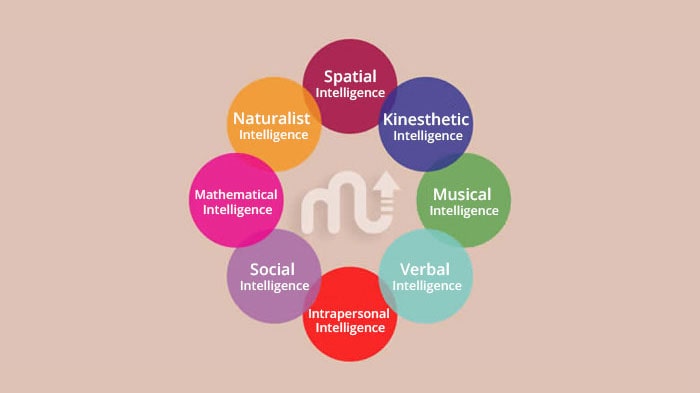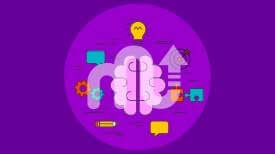Multiple Intelligence Theory and 9 Types of Multiple Intelligence
In that case, should we say that they are ‘intelligent’ or ‘not intelligent’?
At this point, it is useful to mention Howard Gardner's multiple intelligence theory.
What Is Multiple Intelligence Theory?
Multiple Intelligence Theory: It is an approach developed by the American psychologist Howard Gardner, who is doing scientific research about intelligence sensitivity at Harvard University.
The theory of multiple intelligences postulates that intelligence is only one, there are frames of mind indicating that every dominant intelligence is dynamic and can be improved. And this influences directly on types of learning styles.
The multiple intelligences are divided into subclasses within themselves (types of intelligence). Human intelligence is divided into 8 subcategories in which represent the different types of intelligence that indicate where people can use their intelligence more effectively. - investigations continue on the 9th subcategory.
💡 TIP: If you are looking for a way to grow your intelligence skills day by day, look no further! Try MentalUP Intelligence Games while enjoying daily workouts based on your performance and the skills you'd like to improve. This way, you can be more successful in exams such as 8 plus, in school classes, or in work life.
What Are the 9 Types of Intelligence?
We gave the definition of multiple intelligence theory and the multiple types of intelligence. Now let's look at the “9 types of intelligence” one by one.

Spatial Intelligence
Spatial intelligence is a type of intelligence that is related to visuality and is actually called visual-spatial intelligence. The visuality here is about vision, as well as visualization in the mind. It is one of the cognitive capacities that develop very early because human beings can see from the moment of birth.
Intelligence Characteristics
Having a strong visual memory, imagining, and sizing the input are characteristics of the spatial learning style. People with spatial intelligence are good at graphic designs, and they solve jigsaw puzzles swiftly. Visual intelligence is most clearly observed in artistic people because their visual intelligence is usually above average.
Examples of Famous People with High Spatial Intelligence
- Leonardo Da Vinci
- Vincent Van Gogh
- Alfred Hitchcock
- Frank Lloyd Wright
- Georgia O’Keeffe
- Henri Matisse
Career Choices
- Mechanical Engineer
- Interior Designer
- Photographer
- Architect
- Artist
- Fashion Designer
- Filmmaker
Exercises to Improve

Kinesthetic Intelligence
Kinesthetic intelligence is a type of intelligence that is related to brain-body coordination and is also known as bodily-kinesthetic intelligence.
Intelligence Characteristics
People who have developed kinesthetic intelligence use their gestures and mimics well, and they have good hand eye coordination.
Therefore, they are very good at telling their feelings and thoughts. Not just for daily conversation, they are also good at artistic compositions because of their balanced body-mind union.Example: A dancer who gives a message with perfect choreography.
The mental and physical harmony of people with good bodily intelligence is immediately noticeable. They use their bodies quite artistically because they are good at performing their thoughts, which we can see in successful athletes.
Examples of Famous People with High Kinesthetic Intelligence
- David Copperfield
- Michael Jordan
- Tiger Woods
- Jim Carrey
- Charlie Chaplin
- Harry Houdini
- Bruce Lee
Career Choices
- Dancer
- Actor
- Craftsperson
- Mechanic
- Athlete
- Carpenter
- Physical Therapist
Exercises to Improve
Using MentalUP is an excellent choice for all intelligence types, including Kinesthetic Intelligence! 🤾
MentalUP features 150+ learning games as well as 240+ physical exercises for kids. With fun and educational activities, children can strengthen their minds and bodies! 🏅
Try MentalUP's performance-based, daily programs to improve fast! 🤸✨

Musical Intelligence
Musical intelligence is a type of intelligence, also called musical-rhythmic intelligence, which is related to high sensitivity to sounds and music found in nature. It is a person's ability to interpret, combine and manipulate sounds. Children with musical intelligence generally also have an auditory learning style.
Intelligence Characteristics
People who have a high level of musical intelligence may sometimes play an instrument without any training. They can learn and play music by only listening to it and maximize their musical intelligence by using music apps for kids.
Examples of Famous People with High Musical Intelligence
- Wolfgang Amadeus Mozart
- Ludwig van Beethoven
- Stevie Wonder
- Paul McCartney
- Marin Alsop
- Cher
Career Choices
- Musician
- Composer
- Conductor
- Piano Tuner
- Music Therapist
- Choral Director
- Music Teacher
Exercises to Improve

Verbal Intelligence
Verbal intelligence is a type of intelligence that is related to language skills and is actually called verbal-linguistic intelligence. Education systems around the world have been highly focused on lectures that address and develop verbal intelligence in students.
Intelligence Characteristics
It is the ability to express thoughts with words and to understand what is described in words. People who have a high level of verbal intelligence have good composition and presentation skills.
Examples of Famous People with High Verbal Intelligence
- Maya Angelou
- William Shakespeare
- Dostoyevski
- Charles Dickens
- Martin Luther King Jr.
Career Choices
- Writer
- Poet
- Politician
- Linguist
- Copywriter
- Editor
- Journalist
- Teacher
- TV or Radio Presenter
- Speech Therapist
- Public Speaker
Exercises to Improve

Intrapersonal Intelligence
Intrapersonal intelligence is the ability of a person to know oneself well and to make this knowledge useful. This type of intelligence can help a person focus on planning and managing their life.
Intelligence Characteristics
Skill-goal correspondence is important for this type of intelligence. People with advanced intrapersonal intelligence have an almost perfect prediction of what they can do because they have high self-awareness.
They are likely to achieve successful results from the work they started. Those who are capable of combining and interpreting their behaviour alongside external factors have advanced intrapersonal intelligence.
Examples of Famous People with High Intrapersonal Intelligence
- Sigmund Freud
- Eleanor Roosevelt
- Socrates
- Mahatma Gandhi
- Anne Frank
- Virginia Woolf
- Aristotle
Career Choices
- Author
- Poet
- Thespian
- Philosopher
- Religious Leader
- Lawyer
- Entrepreneur
- Historian
- Librarian
- Psychologist
Exercises to Improve

Mathematical Intelligence
Mathematical intelligence is the ability of a person to use numbers and symbols effectively, to create abstract concepts, and apply good reasoning. It is also called logical-mathematical intelligence.
Intelligence Characteristics
Those who have advanced mathematical intelligence are good at analytical thinking, putting pieces together, making deductions, and reasoning.
Reasoning is part of their thinking process. Mathematical intelligence allows one to establish a cause and effect relationship and obtain concrete results by posing the right questions.
They are good at strategy games. And, people who prove themselves in numeric professions have good mathematical intelligence.
Examples of Famous People with High Mathematical Intelligence
- Stephen Hawking
- Isaac Newton
- Albert Einstein
- Mark Zuckerberg
- Thomas Edison
Career Choices
- Computer Programmer
- System Analyst
- Accounting Specialist
- Finance and Investment Consultant
- Mathematics Specialist
- Statistician
- Doctor
Exercises to Improve

Social Intelligence
Social intelligence or interpersonal intelligence is the ability of a person to analyze individual and social behaviour well and to communicate well. Those who have developed social intelligence are successful in understanding and even managing the feelings of other people.
Intelligence Characteristics
Politicians, trainers and similar professional groups that are good at addressing communities have advanced social intelligence. High social intelligence gives a person advantages such as a wide social environment, being loved and accepted.
Examples of Famous People with High Social Intelligence
- Bill Gates
- Mother Theresa
- Bill Clinton
- Ronald Reagan
- Oprah Winfrey
Career Choices
- Politician
- Manager
- Counsellor
- Public Relations Manager
- Administrator
- Nurse
Exercises to Improve

Naturalist Intelligence
Natural intelligence is the ability to interpret nature and it is also called naturalistic intelligence.
Intelligence Characteristics
People who have advanced naturalistic intelligence are good at observing and examining living organisms and nature.
It is no coincidence that those who have good naturalistic intelligence are willing to follow animals, watch nature documentaries and play animal games for kids. Also, they tend to enjoy archaeology, mountaineering, tracking, documentary filming, botany, and geology fields.
Examples of Famous People with High Naturalist Intelligence
- Charles Darwin
- E.O. Wilson
- Rachel Carson
- Jacques Cousteau
- John Muir
- David Attenborough
- Jane Goodall
Career Choices
- Farmers
- Botanists
- Environmentalists
- Conservationists
- Biologists
Exercises to Improve
Existential Intelligence
Another type of intelligence that has been studied and added to the multiple intelligences theory is existential intelligence. Existential intelligence is the ability to make effective interpretations about abstract topics which are hard to process.
Intelligence Characteristics
Those who use their existential intelligence well are capable of interpreting, explaining and presenting the concepts about human existence which are hard to process.
Examples of Famous People with High Existential Intelligence
- Buddha
- Socrates
- Friedrich Nietzsche
- Søren Kierkegaard
- Jean-Paul Sartre
- Simone de Beauvoir
Career Choices
- Meditation Instructor
- Yoga instructor
- Physicist
- Mathematician
- Public Speaker
- Philosopher
Exercises to Improve
Key Takeaway
It is no coincidence that research on intelligence always points to one common point. All scientific studies on the human brain and intelligence show that intelligence is a potential that can be developed, and the biggest part of this development occurs during childhood.
Understanding intelligence through Gardner’s categorization is an important part of school curricula around the world. Instructors try to group children according to their mental skills and create appropriate directions for them through exercises tackling multiple intelligence in the classroom.
It is important to direct students who use verbal intelligence more effectively to the relevant professions or the students who use mathematical intelligence to the professions in the field of mathematics.
Which Type of Intelligence Defines You Best Among All Types?
Gardner’s multiple intelligence types classify human intelligence into 8+1 different types (in fact, 9 different categories). Remember that levels of intelligence can be enhanced by different practices, tests and activities.
So, which one is yours among these categories of intelligence? Take this Howard Gardner Multiple Intelligences Test to find out!
Do you want to find out in which area you are more successful by testing your mental skills with a scientific and fun game?
Play MentalUP games to improve memory, visual intelligence, verbal intelligence, mathematical intelligence, attention and concentration.
MentalUP is a scientific application developed to support children's mental skills and increase school achievement and also preferred by adults to stay focused. It is possible to compare the scores that children get at MentalUP with their peers.
Moreover, they can make comparisons separately in the areas of attention, memory, and visual-verbal-mathematical intelligence.






